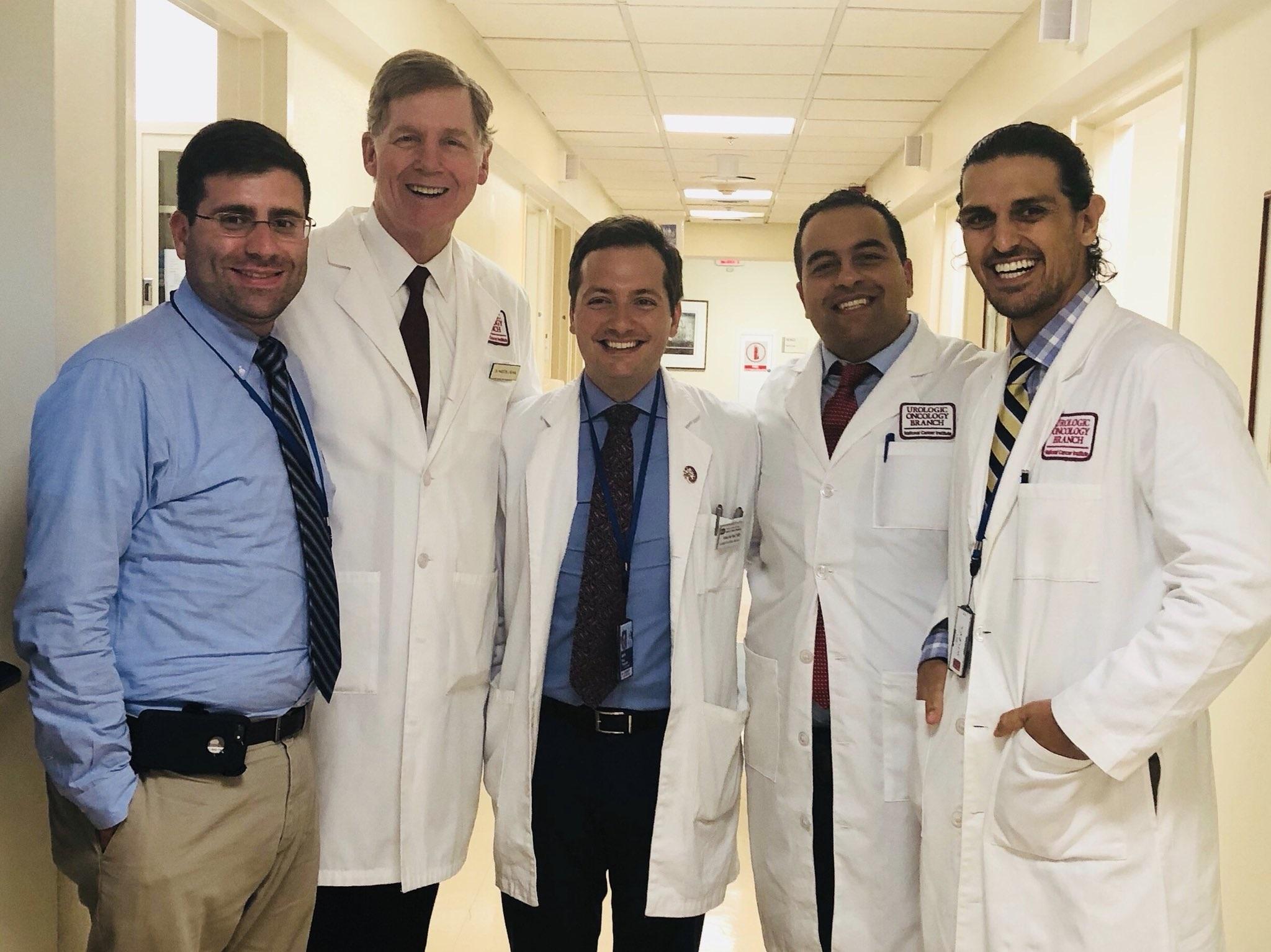Urologic Oncology Fellowship
Urologic Oncology Fellowship
About
The Urologic Oncology Branch offers two- to three-year fellowships accredited by the Society of Urologic Oncology. During the first year, fellows work on basic, translational or clinical research. This time is supplemented by optional courses in clinical trial design, grant writing, biostatistics, bioinformatics, among many other options. During the clinical year, fellows participate on the busiest surgical service at the NIH Clinical Center and have wide exposure to open, laparoscopic, robotic and image-guided procedures. Fellows also rotate on the Urology Services at George Washington University Hospital and Washington Hospital Center in Washington, D.C, as well as with medical oncologists at the NCI where they gain first-hand experience managing clinical trial patients. Fellows participate in kidney, prostate, and bladder multi-disciplinary teams. Fellows have the opportunity to teach rotating urology residents from Georgetown University/Medstar, George Washington University, and Walter Reed Military Medical Center.
Fellows have their own patients which they follow to develop an understanding of care continuity and multidisciplinary management of patients with urologic cancers.
The didactic curriculum covers all aspects of urologic oncology, including surgery, medical oncology, pathology, radiology, and journal clubs.
The “bench-to-bedside” proximity in the new Mark O. Hatfield Clinical Research Center provides a crucial link in rapidly moving biomedical findings in the laboratory into the mainstream of clinical practice. The Clinical Center combines research laboratories with a 250-bed hospital. There are currently over 1,500 active clinical research protocols at the Clinical Center and over 50,000 inpatient days and nearly 100,000 outpatient visits per year.
Eligibility
The NCI Urologic Oncology Fellowship is open to urologists who have completed a urologic surgery residency or residents who have completed at least one year of surgical training. Three positions per year are available for this two-year fellowship program, with a potential option for a third year. Fellows who commit to a third-year are eligible to apply for the NIH Loan Repayment Program.
Applications are accepted throughout the year and decisions are made as qualified applicants are identified.
How to Apply
The Urologic Oncology Branch Urologic Oncology Fellowship Program is accredited by the Society of Urologic Oncology (SUO), and commences July 1. Applications are accepted throughout the year.
Individuals interested in applying should send a cover letter expressing their intention to be considered for this fellowship, and include their SUO Common Application, a Curriculum Vitae and three letters of recommendation to the attention of the two contacts below:
Peter A. Pinto, M.D., Program Director
Urologic Oncology SUO Fellowship
Center for Cancer Research, National Cancer Institute, Bldg. 10 CRC, Rm 2W-5940, Bethesda MD 20892
Mark W. Ball, M.D. Associate Program Director
Urologic Oncology SUO Fellowship
Center for Cancer Research, National Cancer Institute, Bldg. 10 CRC, Rm 2W-5940, Bethesda MD 20892
Margot Michels
Fellowship Coordinator
Center for Cancer Research, National Cancer Institute, Bldg. 10 CRC, Rm 2W-5940, Bethesda MD 20892
Program Details
Research
Research in molecular genetic basis of urologic malignancies and work on development of new forms of diagnosis/therapy for patients with these cancers is done in collaboration with other branches/labs at the NCI and is continually evolving. Solid grounding in cancer genetics and molecular biology and unique interface between basic and clinical research; also includes participation in lab/seminars/ journal clubs, NIH-wide lectures, seminars, and on-campus, short-term molecular biology and clinical research training courses, weekly clinical urology conferences and clinical trials of new forms of therapy for patients with localized as well as advanced forms of urologic cancers.
Accepted Candidates
Candidates accepted to the fellowship program will be appointed as a Clinical Fellow in the Civil Service. The stipend is based upon training, experience, etc. Benefits include accruable annual and sick leave, moving and travel expenses to place of duty; health and life insurance policies are available. Once accepted, fellows will be provided with information detailing the benefits of the Civil Service appointment.
Fellows participate...
Fellows participate in two clinical review and teaching sessions each week; daily rounds, x-ray conferences and search and pathology seminars round out the teaching program. Training courses, seminars and journal clubs, lectures and seminars are part of the initial year. Fellows rotate on the urologic surgery services and provide consult service to all patients at the NIH Clinical Center.
